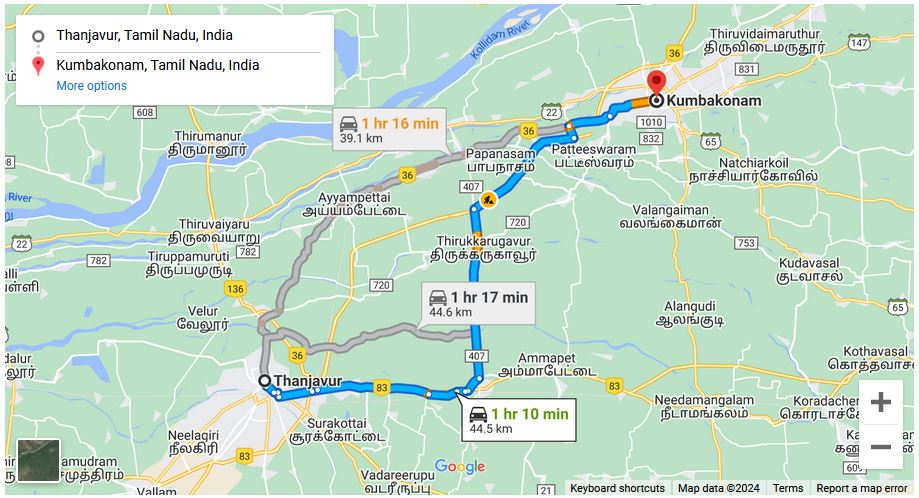The journey from Thanjavur to Kumbakonam in Tamil Nadu, India, is a picturesque drive through the heartland of the state’s temple architecture and cultural heritage. As travelers bid farewell to the majestic temples and rich history of Thanjavur, they embark on a journey that promises to reveal the sacred sites, vibrant culture, and architectural marvels of Kumbakonam.
Leaving behind the grandeur of Thanjavur’s Brihadeeswarar Temple and Maratha Palace, travelers navigate through the rural landscapes and scenic vistas of Tamil Nadu. The road meanders through lush greenery, fertile plains, and quaint villages, where life moves at a leisurely pace amidst the timeless rhythms of agrarian life.
As the journey progresses, travelers pass by fields adorned with vibrant blooms of flowers, palm-fringed avenues, and serene water bodies that reflect the azure skies above. Along the way, they may encounter roadside shrines, small temples, and ancient wells, each imbued with a sense of spiritual significance and cultural heritage.
Approaching Kumbakonam, travelers are greeted by the sight of its towering temple gopurams (entrance towers) and bustling streets that bustle with activity. Kumbakonam is renowned as the “Temple Town” of Tamil Nadu, boasting a rich legacy of religious architecture, ritualistic traditions, and sacred festivals.
The heart of Kumbakonam is its vibrant temple complex, which includes iconic landmarks such as the Adi Kumbeswarar Temple, Sarangapani Temple, and Nageswaran Temple, among others. These ancient shrines, adorned with intricate carvings, colorful frescoes, and towering gopurams, are revered by devotees and admired by scholars for their architectural splendor and spiritual significance.
Beyond its temples, Kumbakonam is known for its vibrant cultural scene and traditional arts. The city comes alive during festivals such as Mahamaham and Navaratri, when streets are adorned with colorful decorations, processions fill the air with music and dance, and devotees gather to participate in rituals and celebrations.
In addition to its religious and cultural attractions, Kumbakonam is famous for its rich culinary heritage and traditional cuisine. Travelers can savor the flavors of South Indian delicacies such as dosas, idlis, vadas, and traditional sweets like Mysore pak and adhirasam, served in local eateries and roadside stalls.
As travelers bid adieu to Kumbakonam, they carry with them memories of ancient temples, vibrant festivals, and the timeless allure of Tamil Nadu’s cultural heritage. In this historic town where tradition and spirituality converge, every moment is a celebration of the region’s rich legacy and enduring legacy as a cradle of civilization, art, and devotion.

